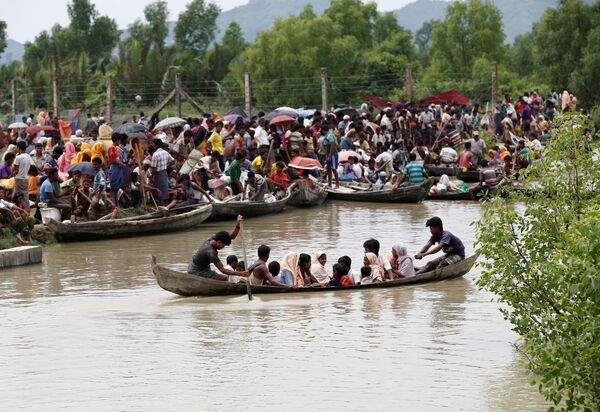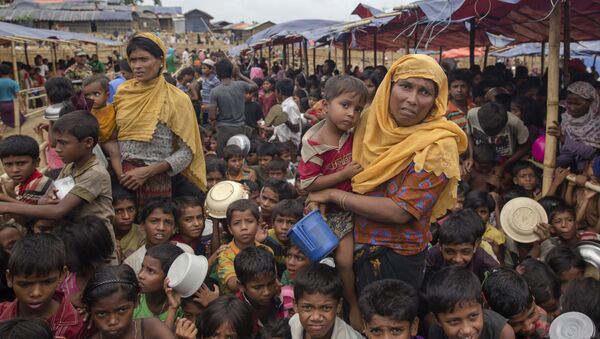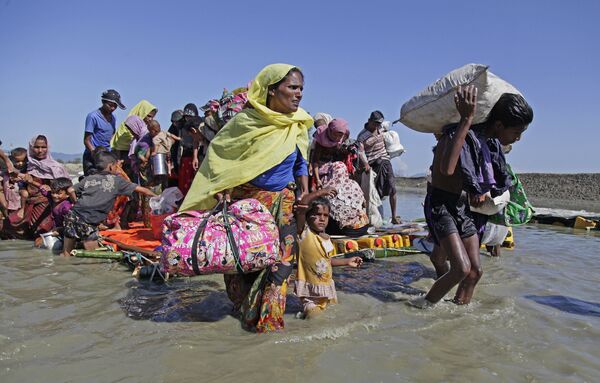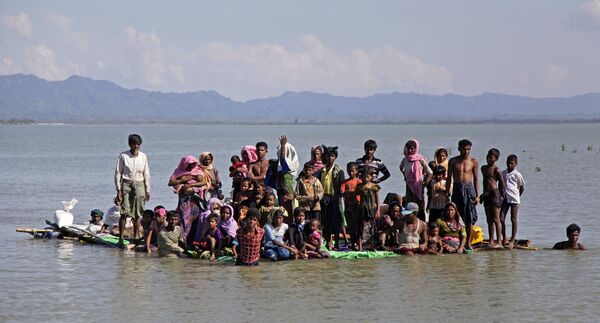Genesis of Catastrophe
Opinions on when exactly the Rohingya arrived in Myanmar (formerly Burma) differ. While some historians claim they have lived in the area for centuries, others believe that the Muslims arrived in the country mainly during UK colonial rule in the 19th and 20th centuries.
Tensions between the Rohingya and local Buddhists have existed for decades, but worsened during the Burma campaign in World War II, when the United Kingdom and its allies fought on one side and Japanese forces on the other, all on Burmese soil. The majority of the Buddhist population in Rakhine State supported Japan, while the Rohingya mostly fought on the side of the Allies.
Burma, then called the Union of Burma, gained full independence from the United Kingdom on January 4, 1948, which to this day is still celebrated in Myanmar as Independence Day. The country’s first constitution, adopted in 1947, granted the Rohingya full legal and voting rights.
However, even before the country gained independence, the Rohingya made an attempt to separate from what then became Burma and join Pakistan. The appeal was subsequently rejected by Islamabad and was followed by a rebellion along the border of Burma and what was then East Pakistan (currently Bangladesh), which continued until a ceasefire was established in 1954.
In 1967, a military coup took place in Burma, resulting in the Union Revolutionary Council, led by General Ne Win, coming to power. A new constitution was adopted in 1974, followed by the Burma Citizenship Law in 1982. This law enumerated which nationalities were to be considered citizens of the country, and the Rohingya were not on the list. This meant that members of the ethnic minority were immediately stripped of their citizenship. The law remains in force to this day.
The country has experienced waves of violence over the decades, but, as a senior associate with the East Asia Program at the Stimson Center, Yun Sun, put it, "There was tension, but it’s not really a conflict." This changed in June 2012, when the rape and murder of a young Buddhist woman sparked mass protests and clashes between the Rohingya and Buddhists in the state of Rakhine, leaving over 200 people dead.
Tensions grew over the next years, with similar clashes erupting across the country, claiming dozens of lives and leaving thousands displaced.
READ MORE: 'Biggest Crisis in Decades': 40,000 Rohingya Children All Alone in Refugee Camps
"The fundamental cause remains to be the anti-Muslim sentiment among the majority Burmese population," Yun said, but stressed that "the issue defies any simplified single explanation."
According to Simon Adams, executive director of the Global Centre for the Responsibility to Protect, the current crisis in Rakhine is "the product of a long history of discrimination, exclusion and terror."
"The difficult question though is what triggered the current crisis. One way of seeing it is [that] given the hostility that defined the ethnic ties in the country, it [the situation] over time assumed the form of a time bomb that exploded in the past months," K. Yhome, a senior fellow with the Observer Research Foundation, told Sputnik.
The unstable situation understandably gave rise to several insurgent organizations, the first one being the Rohingya Patriotic Front (RPF), which was founded in 1974. In 1982, as the RPF suffered losses at the hands of Burmese forces, the group’s more radical members left to create the Rohingya Solidarity Organization (RSO). The Arakan Rohingya Islamic Front, created in 1986, included members of both the RPF and the RSO, but the latter subsequently united with the ARIF in 1998, creating the Arakan Rohingya National Organization (ARNO).
Listen to what @AdwaAlDakheel says in a reflection to the challenge. She carried a kit full of humanitarian assistance Rohingya refugees receive from UNHCR. This is what she said right after going through the experience. Very touchy. #WithRefugees #Rohingya pic.twitter.com/2Q4jLNdegr
— Mohammed Abu Asaker (@mabuasaker) 20 декабря 2017 г.
However, the current escalation of violence was triggered by the actions of the Arakan Rohingya Salvation Army (ARSA), established in 2013. The group was little known until 2016, when it carried out coordinated attacks in Rakhine, killing nine police officers.
"There are links between the ARSA terrorist group and extremist groups from Pakistan. … These groups want to create chaos and lawlessness in Northern Rakhine in order to create fertile ground for terrorists," Ye Htut, a visiting senior fellow with the Yusof Ishak Institute, told Sputnik.
What Happened in August?
On August 25, ARSA militants carried out simultaneous attacks on police outposts in Rakhine. As many as 71 people were killed, including 12 police officers and civil servants, as well as 59 militants. The country’s State Counsellor Daw Aung San Suu Kyi condemned the "brutal" attack, stating that it was aimed at undermining peace efforts in Myanmar.

The authorities responded to the attack harshly, resulting in over a hundred people being killed in the first week of clashes between government forces and the Rohingya. This also led to thousands of Rohingya fleeing from Rakhine to neighboring Bangladesh.
In early September, amid the continuous clashes, Myanmar limited access of all UN agencies to the northern part of Rakhine, denying them the ability to deliver humanitarian aid to the area.
By the end of the first week of September, the number of new Rohingya refugees in Bangladesh reached 150,000, sparking serious concern among other countries and international organizations, as well as Muslim diasporas across the world.
"The 25 August attack by a group of Rohingya terrorists armed mainly with knives gave the Myanmar military the pretext it needed to conduct a policy of ethnic cleansing in Rakhine State. The result has been the quickest and most brutal episode of ethnic cleansing the world has seen since the wars in the former Yugoslavia. The so-called ‘clearance operations’ actually constitute crimes against humanity under international law," Adams told Sputnik.
According to the latest data of the International Organization for Migration (IOM), more than 625,000 refugees have fled to Bangladesh since the crisis in Rakhine broke out.
In December, Doctors Without Borders (MSF) revealed data showing that at least 9,000 Rohingya Muslims died in the state of Rakhine in the first month since the start of the clashes. As many as 6,700 of them are estimated to have been killed, including at least 730 children under age five, the MSF said.
United Nations' Reaction
On September 12, a spokesman for the UN Secretary-General, Stephane Dujarric, said that the number of Rohingya civilians seeking refuge in Bangladesh less than three weeks after the recent outbreak of violence was almost 370,000. The next day, UN Secretary-General Antonio Guterres slammed the Rohingya displacement as ethnic cleansing.
"When one-third of the Rohingya population had to flee the country, can you find a better word to describe it?" he said.
The UN Security Council (UNSC) has also expressed serious concern over the situation, advocating urgent steps to end the violence, de-escalate the situation, re-establish law and order, ensure the protection of civilians, restore socioeconomic conditions and address the refugee problem.
“I don’t have any of my brothers and sisters left" ~ Brutal, methodical massacre of #Rohingya civilians by Burmese soldiers in uniform https://t.co/kFagRaabBy pic.twitter.com/yTfJDadoPl
— Human Rights Watch (@hrw) 19 декабря 2017 г.
Responding to Secretary-General Guterres’ remarks, the permanent representative of Myanmar to the United Nations, Hau Do Suan, refuted the allegations of ethnic cleansing as "unsubstantiated," stating that the issue in Rakhine was "extremely complex."
After Guterres in late September called the situation in Myanmar "the world’s fastest developing refugee emergency, a humanitarian and human rights nightmare," the country’s government invited the UN chief to visit Myanmar to assess the situation firsthand.
In early October, the UN Office for the Coordination of Humanitarian Affairs (OCHA) and UN International Children’s Emergency Fund (UNICEF) issued a joint statement saying the updated relief plan for Myanmar’s Rohingya refugees was seeking $430 million in donations to expand operations for people at camps in Bangladesh. The UN Refugee Agency (UNHCR) later announced that international donors, led by the United Kingdom, the European Union and the United States, had pledged $344 million to the cause.
A month in #Myanmar: 6,700 #Rohingya have been killed. About 70% were shot, about 9% were burned. International aid is crucial. For cases like this we need international #military #peacekeeping missions as well as world class medical support. Source: https://t.co/Iyt1ZIanRe pic.twitter.com/ohrKabkd4T
— Simon Kuestenmacher (@simongerman600) 19 декабря 2017 г.
In November, the UNSC issued a presidential statement on the situation in Myanmar, which became the first such statement concerning the country in a decade.
"The Security Council calls upon the Government of Myanmar to ensure no further excessive use of military force in Rakhine state," the statement said, expressing concern over the "significantly and rapidly deteriorating humanitarian situation" in Rakhine state. The council also condemned the August 25 attacks against Myanmar’s security forces and human rights violations carried out by ARSA.
According to the executive director of the Global Centre for the Responsibility to Protect, Simon Adams, the declaration "was an important statement of condemnation, but words are not enough."
"The Rohingya need action to pressure the Myanmar government to stop committing atrocities and to hold those responsible for ethnic cleansing in Rakhine State accountable," the expert stressed.
Yun also expressed concern that the document, which the country’s authorities are required to implement, could face local opposition.
International Repercussions
Despite the world generally criticizing the outbreak of violence and calling for support to the refugees, the reaction has differed from country to country.
For example, in August, Malaysia decided to deny the arbitrary issuance of UNHCR asylum-seeker cards to Rohingya refugees in a bid to prevent a large influx of migrants to the country.
"It is not that we are not being humanitarian," Malaysian Deputy Prime Minister Ahmad Zahid Hamidi said, as quoted by the local Star newspaper, explaining that the government’s priority lies with its people and their welfare.
The decision came just two years after the previous escalation in Myanmar. During this time, Thailand, Malaysia and Indonesia were faced with a humanitarian crisis, as thousands of Rohingya refugees fled to them from Myanmar. The solution to the crisis eventually required coordinated efforts by Thailand, Myanmar, Malaysia and Indonesia, as well as other states.
Other countries, especially those not facing the risk of an imminent influx of Rohingya refugees, took a more humane approach.
READ MORE: 'Beaten, Sexually Abused': IOM Official Decries Plight of Rohingya Children
In Russia, authorities have repeatedly criticized the violence in Myanmar, condemning the August 25 attacks. In early September, during a meeting with Egyptian President Abdul Farrah Sisi, Russian President Vladimir Putin expressed his "extreme concern" over the crisis in Myanmar, condemning "all manifestations of violence, regardless of who was responsible for them and against whom they were directed, including against Muslims."
"We oppose any violence and call on the country's authorities to take the situation under control," Putin said at a press conference after the BRICS summit in China’s Xiamen on September 5.
Turkish President Recep Tayyip Erdogan called the clashes in Rakhine a "genocide," while Iranian Foreign Minister Mohammad Javad Zarif addressed Guterres in an open letter urging the United Nations to "undertake all necessary measures towards addressing international concerns about the deteriorating situation in Myanmar."
The United States has also expressed concern about the Rohingya refugees and applauded "the government of Bangladesh’s generosity in responding to this humanitarian crisis." Washington specifically referred to the over 600,000 Rohingya Bangladesh had accepted, and how the country relocated these refugees to a camp in the port city of Cox’s Bazar and provided them with food and water together with various international humanitarian organizations.
The member states of the Organization of Islamic Cooperation (OIC) have called on Myanmar’s government to end the ethnic violence in Rakhine State. The French Foreign Ministry has similarly called on Myanmar’s government to cease violent actions and seek a peaceful solution to the crisis, while Doctors Without Borders (MSF) called on the international community to step up humanitarian efforts to prevent a public health disaster in Bangladesh.
"Lots of governments like to talk about the plight of the Rohingya. Very few are actually prepared to do anything to help them," Simon Adams told Sputnik.
Simon added that despite local non-governmental organizations (NGOs) already providing assistance to UNICEF, more local partners are needed.
READ MORE: HRW Accuses Myanmar's Soldiers of Systematically Raping Rohingya Women
"We need local partners. And for this, more than 20 partnership agreements with local NGOs have been signed and they are already helping us a lot," the official pointed out.
One of the countries that could really have an effect on the situation in Myanmar is China, which offered to mediate talks between Myanmar and Bangladesh, Adams said.
In November, Chinese Foreign Minister Wang Yi proposed a three-stage solution to the crisis. According to the minister, the first stage would be to establish a lasting ceasefire, after which the parties should engage in bilateral dialogue and search for a solution. The third stage would be to work on reaching a long-term solution based on eradicating poverty, which, according to Wang, was the main reason for the conflict.
"What China says matters. Myanmar’s generals will listen if China tells them that the Rohingya have rights, and that the atrocities are unacceptable and must stop," Adams said.
Yun agreed that China’s mediation could be helpful, stressing that China could "press the military to cease fire and attacks."
"That will be the most important," Yun concluded.
Is Peaceful Settlement Possible?
Ways to a peaceful settlement of the current crisis need to be found as soon as possible, given that time has been of no use in this conflict, Yun said.
READ MORE: Myanmar Military Leadership Responsible for Rohingya Crisis — OHCHR Expert
"The longer we wait, the deeper the disparity is. One thing that people point out is that the military has used this for their political agenda in Myanmar, so arguably reining in the military will help," Yun said, explaining that the military used the August attacks to gain more support among the population.
The first thing that should be done is ceasing military actions, Yun stated. Her words were echoed by Ye Htut, who stressed the need to first restore law and order.
The repatriation of refugees and their resettlement in Rakhine should be the second step, the experts agreed.
"In the long run, address the fundamental anti-Rohingya sentiment in Myanmar through reconciliation, education and integration," Yun expanded.
The issue of citizenship is also an important one, as the 1982 Citizenship Act is still in force and the Rohingya remain stateless people in the eyes of the law. In August, the Advisory Commission on Rakhine State, established in 2016 and led by former UN Secretary-General Kofi Annan, released its final report on the situation in Rakhine. The report, titled Towards a Peaceful, Fair and Prosperous Future for the People of Rakhine, was published on August 23, just two days before the ARSA attacks.
The recommendations listed in the report include the call for Myanmar’s government to begin the process of reviewing the 1982 law, including "re-examining the current linkage between citizenship and ethnicity," with an aim of ensuring "the equitable treatment of all citizens."
READ MORE: Report Accuses Myanmar's Military of ‘Sweeping' Rape of Rohingya Women
The report also recommends that the governments of both Myanmar and Bangladesh should "facilitate the voluntary return of refugees from Bangladesh to Myanmar" in accordance with international standards.
"When refugees from northern Rakhine State return from Bangladesh, the Government of Myanmar should help create a secure environment and, where necessary, assist with shelter construction for those whose homes have been destroyed," the document added.
In line with these recommendations, Myanmar and Bangladesh signed in late November a bilateral agreement on the possible repatriation of refugees back to Rakhine. However, Myanmar’s authorities did not provide any details on the number of refugees that would be allowed to return to the country.
Knut Ostby, ad interim UN resident and humanitarian coordinator in Myanmar, said that the United Nations was not convinced the country had suitable conditions for the return of the refugees yet.
READ MORE: Rights Groups Accuse Myanmar of Wiping Out Witnesses to Rohingya Repression
Ostby stressed that the refugees would need to receive guarantees of a safe return, as well as security and "the opportunity to live a normal life" as part of the society.
Shortly after the signing of the agreement, media reports emerged that the process of repatriation may begin in the next two months, while Bangladesh approved the construction of a temporary accommodation center for the refugees at an island in the Bay of Bengal as a follow-up to the deal.
However, with large-scale repatriation measures expected and hostilities generally receding in Myanmar, thousands of Rohingya persist in their attempts to reach Bangladesh, claiming they have nowhere to return to in Myanmar, thus aggravating the humanitarian crisis.



